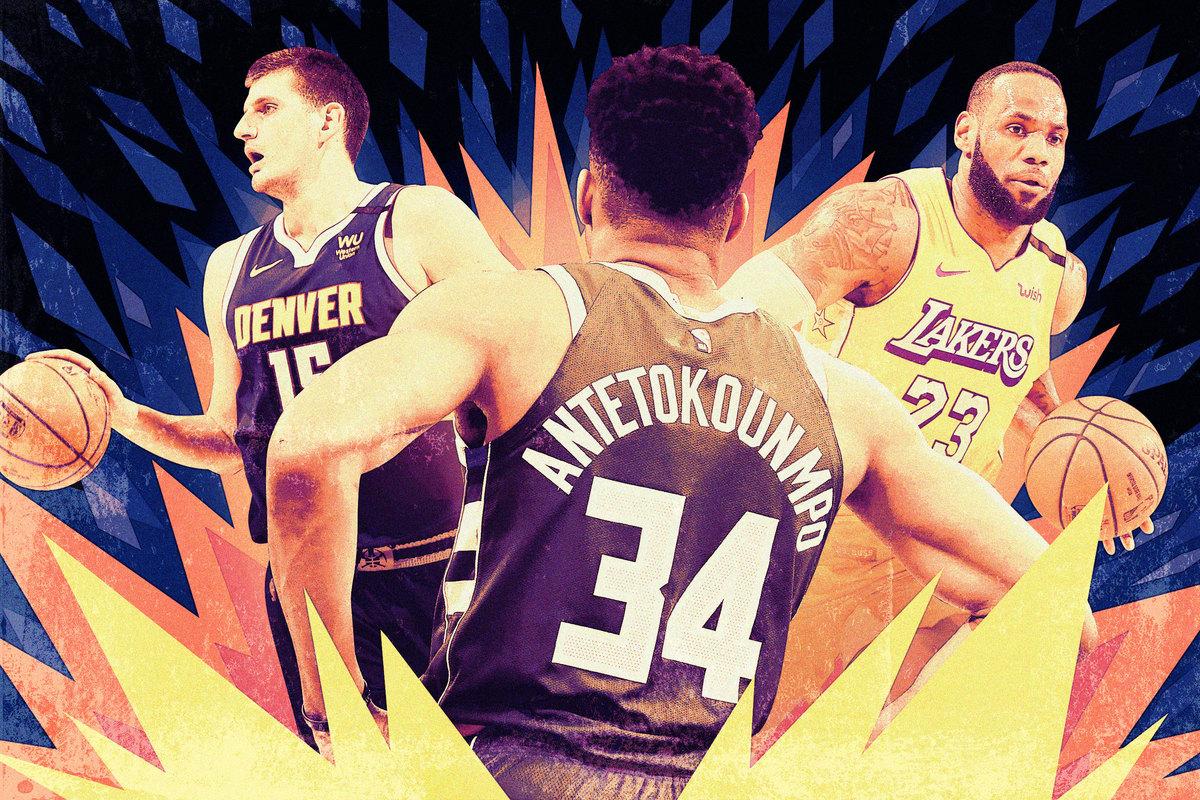
Today we’ll try to answer a simple question with a frustratingly complicated answer: Who creates the most points in the NBA?
The first place to look is scoring, the final step of point creation. By this definition, James Harden creates the most points in the league, on both an overall and per-minute basis (though Giannis Antetokounmpo is surprisingly close in the latter).
But even Harden, the league’s most prolific isolation player, doesn’t create his 36.6 points per game all on his own. Sometimes, he scores after being freed by a Clint Capela screen. At other times, he scores immediately after a Russell Westbrook pass. Points creation involves more than the scorer. So in order to identify the players who are best at every step along the way to a made basket, we need to play with a new stat that encompasses all of the different methods of contribution.
To points scored, let’s first add in assists. Specifically, we’ll count the points scored from each player’s assists as points he helped create. Why do the actual point values matter, instead of just the raw assist total? Because with the rise in 3-pointers, not all assists are created equal.
For instance, as tracked by pbpstats.com, Nikola Jokic has 38 more assists than Giannis Antetokounmpo this season—but only 17 more points created through his assists. (The “assist combos” page on pbpstats.com is missing a handful of assists, which might skew these numbers a trifle compared to the actual full-season stats.) That’s because 56 percent of Giannis’s assists produce 3-pointers (third best out of 106 players with 100-plus assists) while only 27 percent of Jokic’s (101st out of 106) do. Even if the effects only appear on the margins, stars like Giannis, Ben Simmons (who induces 3s on 48 percent of his assists), and Luka Doncic (46 percent) gain a bit of value, while the likes of Jokic, Malcolm Brogdon (26 percent), and Trae Young (29 percent) might not be quite as productive as their assist totals suggest.
But traditional assists alone don’t totally reflect the ways in which a player can help his teammate score. For as much as Giannis is responsible for creating an opportunity for this Khris Middleton 3-pointer with a tricky pass …
… he’s just as responsible for creating an opportunity for this other Middleton 3-pointer with a perfectly timed pick.
So we should also account for the points created by screen assists, which are tracked by NBA Advanced Stats and defined as “the number of times an offensive player or team sets a screen for a teammate that directly leads to a made field goal by that teammate.”
Screen assists are an imperfect stat, often reflecting a player’s role rather than the effectiveness of his screens. (There is admittedly a bit of a Catch-22 dilemma here: Does Rudy Gobert, for instance, set so many screens because of Utah’s offensive philosophy, or does Utah’s offensive philosophy orient toward so many screens because the team has Rudy Gobert?) Their very discussion incited jokes online last week, and beyond being skewed by a player’s role, screen assists have a somewhat vague and flexible definition, depend on a teammate actually making his shot, and don’t capture all of what comprises a worthwhile screen. However, every one of those critiques applies to traditional assists as well, so a mishmash of the two is no problem for our new model.
With these three components, we have a better idea of the number of points a player is involved in creating. This combined metric is still not ideally thorough, as it doesn’t include passes that lead directly to a foul and made free throws, or points that result from the threat a player provides spacing the floor, or points created by a hockey assist—i.e., the pass that leads to a traditional assist—that involve a player’s direct contribution. But it’s the best tool we can build with the information at hand.
So with all that rigmarole out of the way, let’s go to the leaderboard. We’ll look at points created per 36 minutes to account for differences in playing time (along with a minimum of 750 total minutes played). This distinction is important because the Bucks’ frequent blowouts mean Giannis doesn’t play nearly as much as other stars. Among qualified players, Harden ranks first in minutes per game while Giannis ranks 68th; the Rockets star enjoys 21 percent more playing time in which to collect stats than his Bucks counterpart.
And, voila, that adjustment moves Giannis to first place in our humble little stat.
Points Created Per 36 Minutes Leaders
Four players have emerged this season as clear MVP candidates, even on off nights, and those same four players lead this leaderboard, too. No surprise there. In fifth place is Trae Young, posting historic offensive numbers for a moribund Hawks team that can’t seem to create anything at all without him. (Without Young on the court, Atlanta scores a ghastly 91.5 points per 100 possessions—a dozen points worse than the league-worst Warriors offense.) Then comes a mix of different kinds of players, solid proof that this metric doesn’t simply favor guards, wings, or bigs but rather anyone who can help create points in a medley of ways.
Beyond displaying the top four’s preeminence in yet another statistic, this order reinforces the argument for LeBron as the Lakers’ most essential player ahead of Anthony Davis, who is outscoring LeBron at the moment and would become the first teammate ever to outscore James in a season. A huge portion of Davis’s points come directly from his ace teammate’s passes, though. LeBron-to-Davis is the league’s top assist pairing this season, connecting for 116 baskets according to pbpstats.com—more than a third of Davis’s makes.
Combining regular and screen assists, James creates 27.2 points per 36 minutes for others, good for second in the league behind a surprising no. 1. (Stay tuned!) Davis is in 79th place, with less than half James’s total (13.2 per 36). He’s assisted LeBron only 22 times this season.
That’s not an unusual dynamic for a big and wing, of course—Davis is more of a finisher, LeBron more of a distributor, especially in recent seasons. James’s top five seasons by assist percentage are 2009-10 and the past four. It makes sense that L.A. would be interested in trading for Rose, no. 9 on this list, to help maintain an offensive spark in Davis-led units; when Davis plays but LeBron sits, the Lakers score only 100.0 points per 100 possessions (per NBA Advanced Stats), a mark that would rank last in the league.
A more heterodox partnership appears in Denver, where Jokic ranks sixth in the league in points created. The Nuggets star has overcome a slow start to post nearly equivalent numbers to last season, and he contributes in all facets of point creation. He’s one of only four players—along with Domantas Sabonis, Bam Adebayo, and teammate Mason Plumlee—to eclipse 10 points per 36 minutes in points scored, points assisted, and screen points assisted. Combining regular and screen assists, Jokic ranks third in the league, one spot behind LeBron. And his inverted pick-and-roll game with Jamal Murray is a true egalitarian delight: Jokic-to-Murray ranks sixth on the traditional assists leaderboard, with 84 such dimes, while Murray-to-Jokic ties for seventh, with 76. No other teammate pairing sees both assist orientations in the top 50 overall.
Top Traditional Assist Pairings
Outside the top 10 players in the earlier chart, here is the top points creator per 36 minutes for every remaining team.
- Trail Blazers: Damian Lillard, 45.1
- Nets: Spencer Dinwiddie, 44.9 (Kyrie Irving would be no. 1 if he played enough minutes to qualify)
- 76ers: Joel Embiid, 44.1
- Suns: Devin Booker, 43.2
- Wizards: Bradley Beal, 43.0
- Kings: De’Aaron Fox, 42.8
- Magic: Nikola Vucevic, 42.4
- Warriors: D’Angelo Russell, 41.9
- Grizzlies: Ja Morant, 41.5
- Heat: Bam Adebayo, 41.2
- Jazz: Rudy Gobert, 39.4
- Pelicans: Brandon Ingram, 39.0
- Celtics: Kemba Walker, 38.6
- Spurs: DeMar DeRozan and LaMarcus Aldridge, both 37.9
- Thunder: Chris Paul, 37.8
- Hornets: Devonte’ Graham, 37.1
- Bulls: Zach LaVine, 36.8
- Raptors: Kyle Lowry, 36.4
- Knicks: Julius Randle, 34.4
- Cavaliers: Tristan Thompson, 32.9
Every player on this list can hold his own in points per game. But the order helps clarify some measure of role and effectiveness, which offer particular insight during the rollout of All-Star rosters over the next week. For instance, Young, Bradley Beal, and Zach LaVine have generally been grouped together in a “good stats, bad team” category—but as this metric shows, Young and Beal do far more to involve their teammates in the offense than LaVine, who thus falls woefully short of his peers in overall points created.
Speaking of All-Stars, the final player of note will likely become an honoree for the first time. Remember that LeBron and Jokic ranked second and third, respectively, in points created by traditional and screen assists combined. First place by a smidge, however, goes to a player who’s never received an NBA award of any kind—but who has broken out in a big way this season, with added responsibility and all-around production.
Points Assisted Per 36 Minutes Leaders
Most players on this list fall into two camps: either a pure and prolific pass-first point guard or a multi-use assister, able to help create points with both his body and the ball. By way of comparison, Gobert leads the league in screen assist points but doesn’t pass much, so he ranks 11th here, one spot off the leaderboard. Sabonis is second in screen assist points but also contributes to double-digit points with his passing, so he ranks no. 1 even as LeBron holds a healthy lead for the actually recognized assists crown. The Pacers big man won’t enter the MVP discussion, and nor should he, given the absurd talent and statistics of the top quartet. But he’s the fulcrum the Indiana offense rests on, and he adds value in a comprehensive way beyond the basic box score. One wonders whether he’ll maintain this level of productivity once Victor Oladipo returns from injury.
While this final leaderboard exposes Sabonis’s hidden value, it also naturally reinforces Giannis’s dominance. It’s easy to see how he’s no. 1 in overall points created—he reaches the top 10 in total points assisted while also ranking second in points scored per 36 minutes. In other words, combining all the measurable ways a player can contribute to a basket, Giannis is the unsurprising king. What else do we expect from the reigning MVP and presumptive favorite to win again?
Stats through Wednesday’s games.

